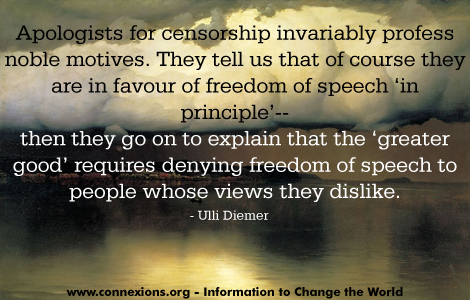
Ulli Diemer — Radical Digressions
Articles Lists
- Selected Articles
- Articles in English
- Articles in French
- Articles in Spanish
- Articles in German
- Articles in Other Languages
- Articles A-Z
- RSS feed
- Subject Index
Selected Topics
- Alternative Media
- Anarchism
- Bullshit
- Capital Punishment
- Censorship
- Chess
- Civil Liberties
- Collective Memory
- Community Organizing
- Consensus Decision-making
- Democratization
- Double Standards
- Drinking Water
- Free Speech
- Guilt
- Health Care
- History
- Identity Politics
- Interviews & Conversations
- Israel/Palestine
- Libertarian Socialism
- Marxism
- Men’s Issues
- Moments
- Monogamy
- Nature
- Neo-Liberalism
- New Democratic Party (NDP)
- Obituaries & Tributes
- Political Humour/Satire
- Public Safety
- Safe Spaces
- Self-Determination
- Socialism
- Spam
- Revolution
- Trotskyism
Blogs & Notes
- Latest Post
- Notebook 11
- Notebook 10
- Notebook 9
- Notebook 8
- Notebook 7
- Notebook 6
- Notebook 5
- Notebook 4
- Notebook 3
- Notebook 2
- Notebook 1
- Scrapbook
Compilations & Resources
- Connexions
- Other Voices newsletter
- Seeds of Fire
- Alternative Media List
- Manifestos & Visions
- Marxism page
- Socialism page
- Organizing Resources
- People’s History, Memory, Archives
- Connexions Quotations page
- Sources
- What I’ve been reading
- What I’ve been watching
Words of Wisdom
- Revolution is necessary not only because the ruling class cannot be overthrown any other way, but also because the class overthrowing it can only in a revolution succeed in ridding itself of all the muck of ages and become fitted to found society anew.
- – Karl Marx & Friedrich Engels

Free speech for me – you shut up
By Ulli Diemer
Apologists for censorship invariably profess noble motives. They tell us that of course they are in favour of freedom of speech ‘in principle’ – then they go on to explain that ‘the greater good’ requires denying freedom of speech to people whose views they dislike.
Donald Gutstein, writing in This Magazine (Franken-Steyn’s monster, July-August 2008) is no exception. Gutstein doesn’t like what Mark Steyn has to say, so he supports the McCarthyite human rights commissions who are ‘investigating’ Steyn’s opinions. Gutstein apparently finds it perfectly normal and acceptable – in fact desirable – for the state to appoint bureaucrats to decide what views Canadians should be permitted to read or hear.
Gutstein makes the point that some people – columnists employed by the corporate media, for example – are more able to make their views heard than ordinary citizens. True enough, though it’s also true that the four Muslim students who complained about Steyn’s article in Maclean’s got massive media coverage for their opinions, arguably far more than Steyn’s own views received.
What is perverse, however, is the assumption that the cure for our free speech deficit is to have even more limitations on freedom of speech. The corporate media suppress views they don’t like? Then let’s get the state into the censorship business too! The more censors, the better!
This of course is the classic position of wannabe totalitarians everywhere: the public can’t be trusted, so we, the superior ones, the ones who always know best, have to suppress anything that we consider to be offensive or dangerous.
This is reactionary crap. As George Orwell said, “If liberty means anything at all, it means the right to tell people what they do not want to hear.” This applies to Mark Steyn as much as to anyone else. Personally, I think that Mark Steyn and Donald Gutstein are both purveyors of dangerous nonsense – and I think it is vital that they be able to express their opinions without fear of state censorship.
Indeed, the right to express offensive views is at the very heart of the principle of freedom of speech. Every conceivable opinion about every important subject will be always offensive to some people. Evolution, feminism, gay rights, criticism of Israel, anti-capitalism – these are all extremely offensive to many people. Do we want to encourage those who find them offensive to appeal to the human rights commissions to suppress those ideas? Is that the precedent we want to set?
I say no. The way to deal with offensive ideas is to argue against them and attempt to refute them, not to ban them.
It’s a pity that conservative columnists are taking a more principled position on this fundamental issue than people who like to portray themselves as progressives.
August 3, 2008
Related:
Opposing Censorship
Free Speech and Acceptable Truths
Canadian Civil Liberties Association
PEN Canada
Index on Censorship
Keywords: Censorship – Corporate Media – Double Standards – Free Speech – Freedom of Expression – Media Coverage of Minorities – Religion and Society
